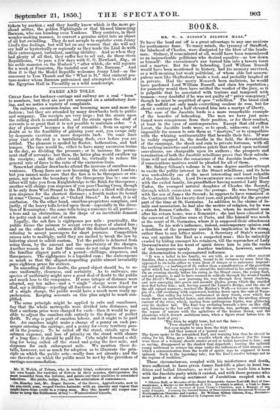FARES AND TOLLS.
CHEAP fares for hackney-carriage and railway are a real " boon " to numbers, but they are not yet arranged on a satisfactory foot- ing, and we notice a variety of complaints.
On railways, excursion-trains are becoming more and more the fashion ; but they are attended by many drawbacks both to public and company. The receipts are very large ; but the strain upon the rolling stock is considerable, and the strain upon the staff of servants is so great that it is not possible to maintain order. "A day of pleasure becomes a day of scramble ; from an agony of doubt as to the feasibility of gaining your seat, you escape only by desperate exertion or more desperate luck. On some lines your visit at the end is a tantalizing flash, over before you are settled. The pleasure is spoiled by fluster, botheration, and bad temper. The cure would be, either to have many excursion-trains in the day, so dividing the pressure ; or to increase the perma- nent staff of servants: but then, the latter plan would swallow up the receipts; and the other would be, virtually to reduce the general rate of fares to the ratio of the excursion-train. Somewhat similar drawbacks attend the increase of omnibus con- venience. Cheap fares are now becoming the rule about London; but you cannot make sure that the fare is to be threepence or six- pence: nor where the boundary of the threepenny line : one om- a:Inswill take you from Knightsbridge to the Balk forhree threepence; another 'will charge you sixpence ifyou pass Cliaring Cross, though it be only from West Strand to the Haymarket; a third will charge you sixpence for the shortest distance ; a fourth makes its bound at some"Circus," another at "Oxford Street." In short, it is all confusion. On the other hand, omnibus-proprietors complain, and justly, of the heavy tolls levied upon them—especially in the direc- tion of Kennington : the same tolls being a nuisance to all parties— a bore and an obstruction, in the shape of an inevitable demand for petty cash in and out of season.
legally, the cab fare is eightpence per mile : practically, the public forces the cabman to accept every degree of abated fare ; and on the other hand, cabmen defeat the distinct enactment, by refusing to accept passengers for short journies. Competition causes cabs to multiply, until they are incited to break the law by loitering about to solicit custom. Yet the public is debarred from using them, by the amount and the uncertainty of the charges. Another reason is the fact that sums do not range themselves in the familiar aliquot parts of a pound—shillings, sixpences, and threepences. The eightpence is a lopsided sum ; the sixteenpence so much so that thealiquot-respecting public almost invariably pays eighteen pence for sixteen.
In amending all these faults, the grand object should be, to se- cure uniformity, clearness, and certainty. As to railways, one species of uniformity might save a good deal of doubt to the public and much loss to the companies. If some integer of distance were adopted, say ten miles—and a " single " charge were fixed for that, say a shilling—rejecting all fractions of a distance-integer or of a single charge, the public would have a much more ready ap- prehension. Keeping accounts on this plan might be much sim- plified. The same principle might be applied to cabs and omnibuses. Say that the whole metropolis were divided into distances, and that a uniform price -were charged for each—then it would be pos- sible to adjust the omnibus ride entirely to the degree of pocket thrift. To stop is part of omnibus labour, and it ought to be _paid for. An omnibus might make a charge of a penny on each pas- senger entering the carriage, and a penny for every territory pass- ed in the journey. To be called off the stand, entails upon the cabman expense, and loss of priority on the stand with chance of a long : it should be paid for. Cabs might demand a shil- ling for being called off the stand and going the first mile, and sixpence for each subsequent mile. We mention these de- tails, however, not so much for adoption as to illustrate the prin- ciple on which the public acts—really does act already; and the one therefore on which the public must be met by the providers of carriage-accommodation.


























 Previous page
Previous page